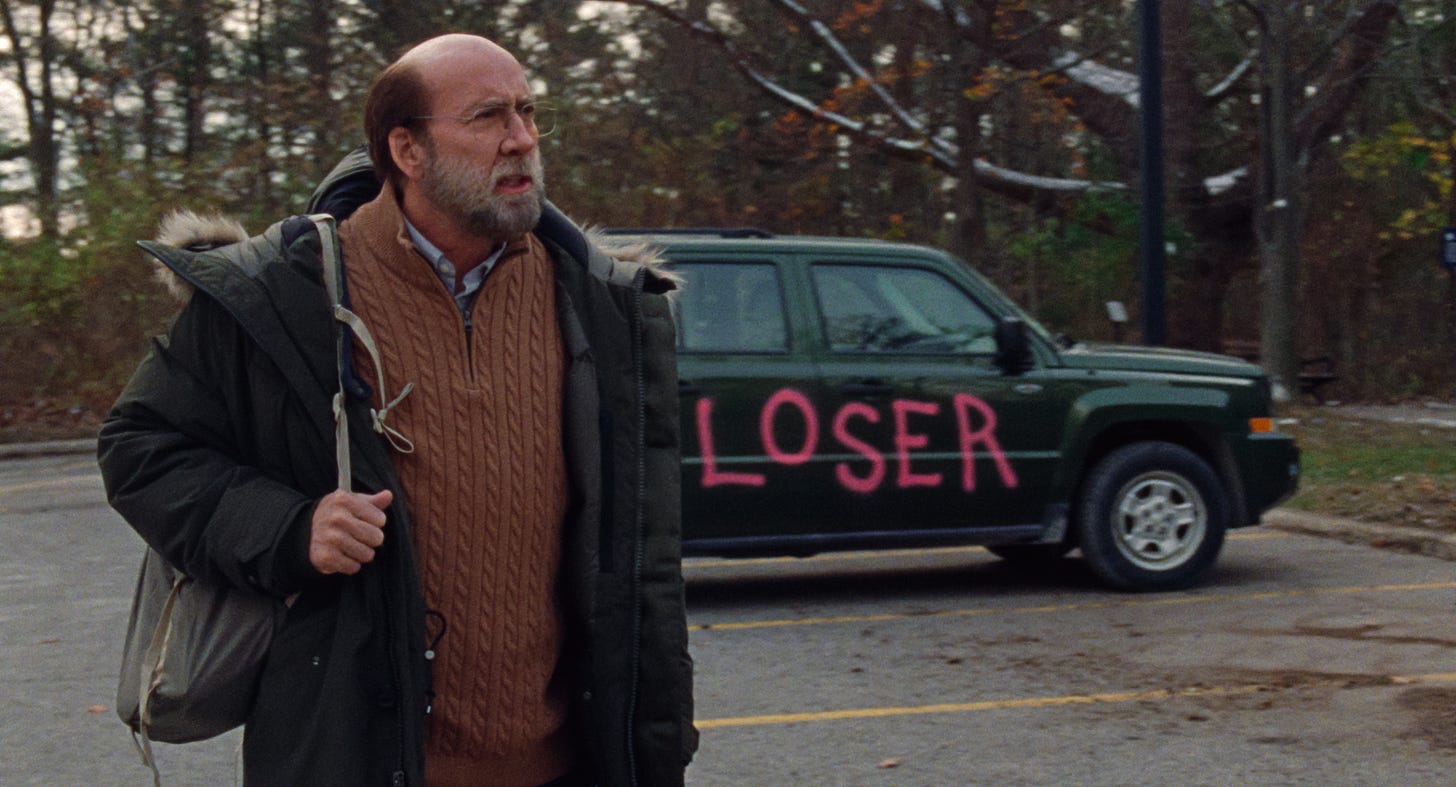Wild Thing: two biologists on Dream Scenario
For this Wild Thing, I'm releasing a transcribed conversation about the Nic Cage movie Dream Scenario I was lucky to have with two biologists. We talk about dreams, consciousness, evolution, &...ants.
Back in early December, I was working on a screenplay in a friend’s office at NYU as she finished her grading for the week. After cleaning our mugs in the office kitchen, we rode uptown, navigating the brand-choked streets to find a place to sit while I waited to meet a group of my women in STEM student mentees for hot chocolate and a viewing of the Rockefeller Center tree.
She’s a scientist, and I wanted to know if she’d seen the film Dream Scenario, which I’d gone to see a few days before. The hallucinatory experience of the film was fresh in my mind, and as someone who has tracked their dreams since childhood, unafraid to be that person to text someone if they were a character the night before, I was curious what biologists thought of the phenomenon shown in the film—an ordinary man who wakes up one day to find himself a dream figure imagined by people across the world, most of whom never even met him. What’s more—he was a biologist who’d studied collective behavior of ants, and ants show collective characteristics that are unique to their species. What parallels were being drawn in the filmmaking?
While there’s a lot more to the plot, and a lot I don’t want to give away, those elements were the ones I turned over with my friend. And we began to joke around about me doing an interview with biologists on their take of the film.
Well, if you know me, you know…that’s exactly what I did. She introduced me to two of her friends, Evan and Gavin, who are Buffalo-based biologists and data scientists with a special focus on behavioral ecology and social behavior. And, yes…ants.
from Kristoffer Borgli’s Dream Scenario (A24)
They were generous enough to say yes.
Over winter break, Evan and Gavin watched the film and wrote back and forth with me about the story’s scientific themes and some of the places where the characters fall short. I learned a great deal by speaking with them, and my own movie-going experience was deepened by the exchange.
But that night, weeks earlier, my friend rode her bike home, and I sat with my students in Bryant Park as we enjoyed our winter snacks in the crowd of ice skaters, shoppers, and tourists fighting for a seat. Despite the scarcity of tables, the snatching up of any chair unoccupied for more than ten seconds, a table about three feet away from us sat unused. It was as though a spell was cast over it—a bouquet of roses left on its surface. The flowers themselves remained untouched. We laughed together for the hour we sat there, marveling at how magical the roses’ appearance seemed. Each time a group got near, they abandoned their plan. At one point, a little girl nearly reached for a stem, but then quickly treated. A collective agreement had been reached, one without words: don’t touch.
That weekend, I spent hours laying on my back at the Hall of Illusions watching Chagall and Kandinsky images projected on the inside of the cathedral. I thought of the flowers from the ice rink, of the connective act of seeing a film, of the strange dance we arrive at as humans in public spaces, and that childlike wonder seems to always linger at the border, ready to pierce through.
My chat with Evan Kelemen, PhD (Researcher and Data Scientist) and Gavin M. Leighton, PhD (Professor and Researcher) starts below:
Juliana: I thought it was interesting that the film plays explicitly with Jung’s idea of the collective unconscious and makes an overt link to psychoanalytic theory with Paul running into his former girlfriend Claire and her writing about the dreams she’d been having of him. This leads to her revealing a global collective unconscious manifesting through these synchronized Paul-dreams, a possibility that is perhaps otherwise not universally accepted by scientists as being observable, but in Dream Scenario, it is. It felt to me like there were connections being made early on that the way ants operate as a collective may actually suggest how a collective unconscious is already at work, just not observable in humans in the ways scientists might like to see in order to make a claim around it.
What was really interesting to me was hearing afterward how ant colonies might mirror the way neurons operate in the human brain. I felt like the filmmakers were making a connection between the individual dreamers as ants themselves in this sort of hive-mind of reality, but I’m also not an evolutionary biologist. So, I want to begin by asking you both if there is a general perception biologists have around ants that outsiders might not be aware of?
Gavin: I think biologists tend to regard ants as paragons of social evolution and as a group they are extremely ecologically successful. In fact, a fairly recent study suggested there were about 2.5 million ants for every person that exists on earth. Ants are found on almost every continent and extend through almost every ecosystem. Few other major animal groups can claim this sort of geographical breadth and abundance. Early on in the movie Nic Cage asks ‘who is here for the lecture on kin selection?’; kin selection is a fundamental theory in social evolution so it would make sense that someone that works on ants would be lecturing on this theory in one of their classes.
Evan: Ants can be selfish. Yes, as a collective they they can accomplish many things, but it is not altruistic. There are fitness advantages to working together. In species that can, workers will lay eggs. In response, policing has evolved where workers eat their sisters eggs who ‘cheat’. What makes them fascinating is why they work together.
That is fascinating. Are ants a subject that is widely studied or are they as niche as they’re presented to be in the film?
Gavin: This is a tricky question. I think within the fields of ecology/evolution/behavior ants are a relatively well-studied group. As far as insect groups as a whole they are possibly the most well-studied group. However, insects are understudied compared to vertebrates if you look at overall species diversity. In other words, there are about as many ant species as bird species in the world (if I’m remembering my species diversity estimates correctly) and there have been considerably more studies on birds. So I don’t think they would be considered some niche subject within biology.
Evan: Research in ants has broad applications. Ants do have an appeal for collective problem solving. Insights leveraged from their collective behaviors have been integrated into cyber security, navigation, and robotics.
Are there any parallels between patterns we might observe in data that could speak to the possibility of a collective unconscious? With that, does data often show that we might all behave in similar ways, even ones that can be predicted?








